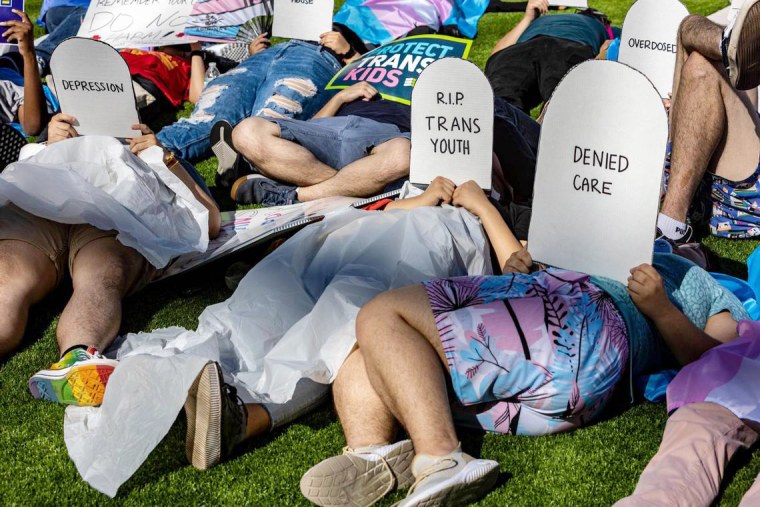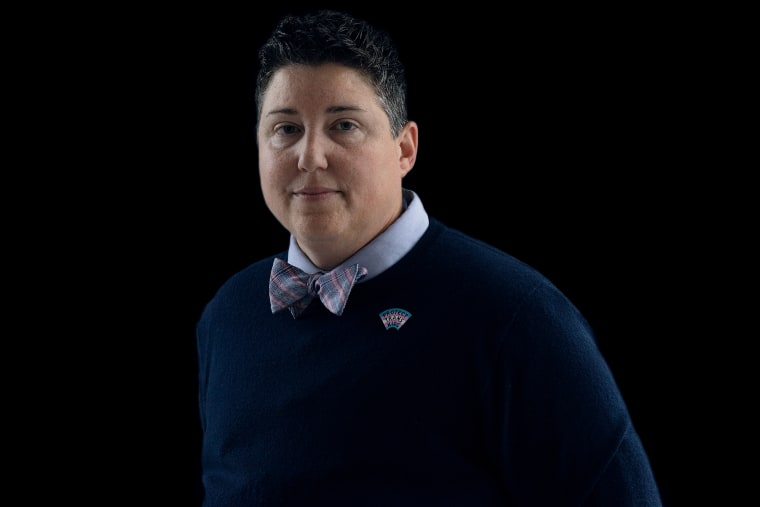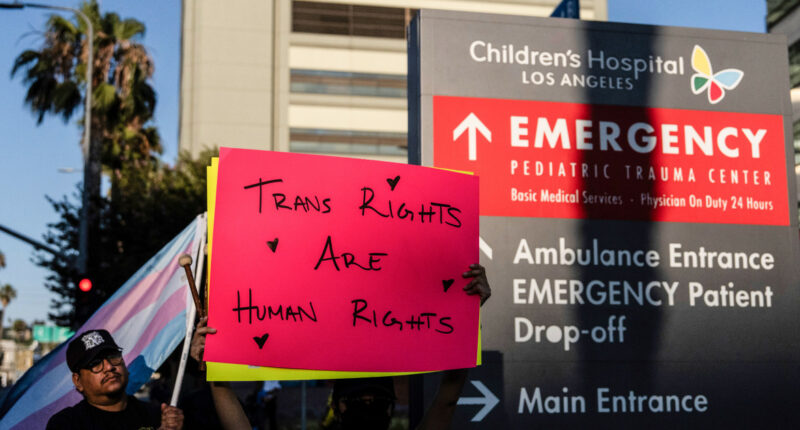Share this @internewscast.com
Over 20 hospitals and health systems have either paused or stopped providing transgender healthcare for minors and some young adults this year, in response to threats of federal inquiries and potential cuts to government funding, as highlighted by an NBC News assessment.
A dozen hospitals declared they have ceased or will cease offering puberty blockers and hormone therapy to trans individuals under 19. Four facilities announced they are discontinuing surgeries related to transitioning for these patients; one stated it halted gender-affirming care for teens, while four temporarily paused care for those under 19 after a January executive order from President Donald Trump, though they resumed after a judge blocked part of the order in March.
Beyond those 21 hospitals, another cluster of five has removed resources on trans care for minors from their websites this year. Of those, one affirmed it still offers trans care to minors, one stated it complies with relevant state and federal laws, and three did not respond to requests for comment. Separately, an Iowa health center stopped providing hormone therapy to trans adults due to a Trump order blocking federal funds from supporting “gender ideology,” as reported by the Iowa Capital Dispatch.
The adjustments are in effect as hospitals strive to align with state regulations, often forbidding discrimination against trans individuals in medical treatment, alongside federal guidance threatening to withdraw federal funding or pursue civil or criminal charges against hospitals continuing to treat patients under 19 with transgender care.
Patients and families impacted by these healthcare changes describe the impact as distressing.
A mother from Florida, who chose to remain anonymous due to fears of harassment or targeting by the government, recently procured one-way tickets to Berlin for her and her 15-year-old trans daughter to relocate there next month. The mother secured a language-learning visa, allowing her minor daughter to reside with her.
When her daughter first sought access to transition care, Florida Gov. Ron DeSantis’ administration and state Republican legislators were trying to ban it, so in September 2021, the teen and her dad started driving 11 hours to Alabama every few months so she could access care at the University of Alabama’s gender clinic. Then, in August 2023, a court allowed a care ban to take effect in Alabama. Last July, they began flying to Washington, D.C., to receive care at Children’s National Hospital.
Last month, the hospital announced in a message on its website that “in light of escalating legal and regulatory risks to Children’s National, our providers, and the families we serve, we will be discontinuing the prescription of gender-affirming medications” effective Aug. 30.
The mom said even if she could find another doctor in the U.S. for her daughter, she fears the family might have just one visit “before the government steps in again.”
“Where can we go?” she said. “Growing up, we were always told that America is the greatest country in the world, and now we’re having to flee so that my child can get the health care she needs, and for our safety.”
‘These threats are no longer theoretical’
Since 2021, 27 states have enacted measures prohibiting access to puberty blockers, hormone therapy and/or surgeries for trans minors as part of a wider effort to restrict trans rights.
Supporters of the legislation say the care has not been adequately studied, can have harmful long-term effects and that minors cannot actually consent to it. However, doctors who treat trans youth say puberty blockers and hormone therapy have been provided to minors who are not trans for decades to treat other conditions, such as precocious puberty. In addition, nearly all major medical associations in the United States support access to transition-related care for minors and oppose restrictions on it, with the American Medical Association calling government restrictions “a dangerous intrusion into the practice of medicine.”
A study published earlier this year in JAMA Pediatrics found that less than 0.1% of adolescents in the U.S. with private insurance in the United States are trans and are prescribed puberty blockers or gender-affirming hormones. A 2024 study published by the Harvard T.H. Chan School of Public Health found that the rate of teens ages 15 to 17 undergoing gender-affirming surgery was 2.1 per 100,000.
The remaining states where care is legal — particularly California, Colorado, Oregon, Illinois, Washington, Connecticut and Pennsylvania — have seen an influx of out-of-state patients, with some parents of trans minors even relocating their families to those states to maintain care for their kids.
Parents of trans youths have seen those states — and hospitals such as the Children’s Hospital Los Angeles, which is home to one of the nation’s oldest gender clinics — as safe havens.

However, in January, the Trump administration began targeting providers of trans care, including an executive order that sought to bar federal funding from going to medical schools and hospitals that provide such care to people younger than 19. In March, a federal judge blocked that part of the order, and some hospitals resumed treatments.
But then, in April, Attorney General Pam Bondi issued a memo that said the Justice Department would investigate doctors who provide transition care to minors under existing laws, including laws against genital mutilation. In July, the DOJ sent subpoenas to more than 20 doctors and clinics that provide such care. A subpoena sent to the Children’s Hospital of Philadelphia, which was made public Monday as part of a legal filing attempting to block the investigations, requested the names, birth dates, Social Security numbers, addresses and parent/guardian information of all patients who were prescribed puberty blockers or hormone therapy.
The Department of Health and Human Services, the Centers for Medicare and Medicaid Services, the FBI and the Federal Trade Commission have also taken action to restrict care, both for minors and adults.
Children’s Hospital Los Angeles mentioned all of these actions and more in a June 12 letter to hospital staff detailing its decision to close the Center for Transyouth Health and Development, which has been running for three decades, effective July 22.
The letter, which a spokesperson for the hospital shared with NBC News, described an HHS review published in May “dismissing current evidence-based care protocols and standards of care while promoting alternative best practices for the treatment of pediatric gender dysphoria.” The HHS review “included dozens of references to CHLA and the Center for Transyouth Health and Development,” the letter said.
“Taken together, the Attorney General memo, HHS review, and the recent solicitation of tips from the FBI to report hospitals and providers of [gender-affirming care] strongly signal this ministration’s intent to take swift and decisive action, both criminal and civil, against any entity it views as being in violation of the executive order,” this hospital’s leadership wrote. “These threats are no longer theoretical. The federal government has already cut off hundreds of millions of dollars from U.S. academic and research institutions for noncompliance with executive orders, often with little to no warning.”
Earlier this month, more than a dozen states, led by New York Attorney General Letitia James, sued the Trump administration to block investigations into doctors and hospitals who provide gender-affirming care to minors.
The complaint argued that the federal government was trying to institute a national ban on such care when Congress has not passed one, violating the 10th Amendment by trying to usurp the power of states that have not passed bans. It also argued that hospitals were being forced to either defy the federal threats or comply and violate state laws against discrimination in medical care.
Taylor Rogers, a White House spokesperson, said in a statement at the time that Americans support Trump’s efforts to stop “the despicable mutilation and chemical castration of children,” using inflammatory language to describe transition care.
“The President has the lawful authority to protect America’s vulnerable children through executive action, and the ministration looks forward to ultimate victory on this issue,” Rogers said.

Robin Maril, an assistant professor of constitutional law at Oregon’s Willamette University, said the Trump administration is attempting to restrict access to transition care through guidance issued by regulatory agencies. That guidance tells doctors and hospitals “exactly how the government is going to go after them,” Maril said.
Hospitals are weighing losing all federal funding, which could force them to close, Maril said, or standing up to the Trump administration.
“To stand up to the Trump administration at this point would result in kids losing care for all sorts of things,” Maril said.
‘That’s just not fair’
The climate created by the administration’s policies, the investigations and the legal battles have been surreal for Dr. Kade Goepferd, the chief education officer at Children’s Minnesota and a pediatrician in the hospital’s Gender Health Program, which has not ceased or paused trans care for minors.
Goepferd, who uses they/them pronouns, said their patients’ parents are scared, and the kids don’t understand why their friends can access any health care when needed, but they might not be able to access this specific type of care because they’re trans.
“They feel very singled out,” Goepferd said. “The teenagers feel a lot of hopelessness. The younger kids feel a lot of fear for what their future may or may not be like.”

Goepferd said they have several patients who have moved or plan to move out of the country due to the increasingly restrictive care landscape for trans youth, and the number of out-of-state patients they see has increased over the last few years. The clinic’s waitlist for a first appointment is about six months.
They said one of their greatest concerns “is that we are tying the ability of transgender young people to access care they need, and the ability of their parents to make medical decisions for them, to the general public’s ability to understand who they are and what their medical care is.”
“That’s just not fair,” they said. “We don’t do that with other areas of medicine. We rely on medical guidelines and expertise to make decisions. So we’re treating essential health care for transgender youth as exceptional in some way, and what I wish people knew more than anything is that it is not. I provide this type of health care the same way I provide any other type of health care.”

As for the Florida mom, she said that as soon as her daughter could talk she would point to Daphne in the cartoon “Scooby Doo” and say, “I that girl.” A psychiatrist said the child was “persistent, insistent and consistent” in her gender for years, and they have supported her and spent at least $7,500 on travel to access care in other states.
But now, she said, it feels like they’re out of options, and she’ll be flying to Berlin with her daughter in September and leaving her three other children in the States with their dad.
“It was like a nice fantasy that I would live in Europe one day, but then it became this absolute necessity, and I have to leave my other kids, and I don’t even know how to explain how fearful I feel and how heartbreaking this is,” she said.











